
Astrology has been an integral part of Indian culture for centuries, weaving its way into the lives of people from birth to marriage and beyond. Rooted in the Vedic tradition, astrology, or “Jyotish Shastra,” offers guidance based on the movements and positions of celestial bodies. It is not merely a tool for predicting the future but is often seen as a spiritual guide that influences significant milestones in one’s life. Whether it’s the birth of a child or the solemn vows of marriage, astrology plays a pivotal role in shaping decisions and beliefs in Indian households.
Astrology at Birth: Understanding the Horoscope (Kundli)
One of the most prominent ways astrology influences life in India is right at the time of birth. As soon as a child is born, their Kundli or Janam Patri (birth chart) is prepared. The Kundli is essentially a celestial map showing the exact positions of the planets and stars at the time and place of the child’s birth. This chart is believed to be a blueprint of the individual’s life journey, offering insights into their personality, strengths, weaknesses, and future challenges.
Key aspects of a Kundli include:
- Rashi (Zodiac sign): This is derived from the moon’s position at birth and is central to understanding the person’s nature and destiny.
- Nakshatras (Star Constellations): The 27 lunar mansions that divide the sky are important in determining characteristics and fortunes.
- Dasha (Planetary Periods): A timeline of planetary influences on a person’s life.
Families often consult astrologers to read the child’s Kundli, believing it can help them make better choices for the child’s future education, health, and career paths.

Naming Ceremony (Namkaran): Astrological Influence on Identity
In many Hindu traditions, the Namkaran or naming ceremony is deeply influenced by astrology. The Nakshatra and planetary position at the time of birth guide the selection of the child’s name. Specific syllables or sounds are considered auspicious and are believed to bring good fortune to the child. The name thus becomes more than just an identifier; it’s a spiritual connection to the cosmos, chosen to align with the child’s astrological chart.
Education and Career Choices
As children grow, astrology is often consulted to determine their strengths and weaknesses, guiding parents in choosing appropriate educational paths and career options. Based on the planetary placements in the fifth house of a Kundli (which rules education and intellect), astrologers may suggest subjects or fields that align with the child’s cosmic destiny. For example, if the planet Mercury (associated with intelligence and communication) is strong, the individual might be advised to pursue careers in fields like writing, teaching, or law.
Astrology in Marriage: Matching Horoscopes
Perhaps the most significant role astrology plays in Indian culture is during marriage. The concept of Kundli matching or Gun Milan is crucial in arranging marriages, especially in traditional families. Before a marriage proposal is finalized, the horoscopes of the prospective bride and groom are matched to ensure compatibility. This involves comparing eight different aspects or Kootas (Gunas) of the two horoscopes, which include:
- Varna (Spiritual compatibility)
- Vashya (Power equation)
- Tara (Health and well-being)
- Yoni (Sexual compatibility)
- Graha Maitri (Mental compatibility)
- Gana (Temperament match)
- Bhakoot (Family harmony)
- Nadi (Childbirth compatibility)
If the couple achieves a favorable score (usually 18 out of 36), the marriage is considered auspicious. In some cases, remedies or rituals are performed to nullify any negative planetary influences, ensuring that the union brings happiness and prosperity.
Timing of the Wedding: The Importance of Muhurat
Once the compatibility of the couple is established, the next step is to determine the Muhurat, or the most auspicious time and date for the wedding ceremony. This is based on the lunar calendar and planetary positions. Choosing the right Muhurat is considered crucial for the couple’s future happiness and the success of their marriage. Astrologers take into account the Rashi and Nakshatra of both individuals to select the perfect time when the planets are most favorable.
Post-Marriage Predictions: Ensuring Marital Bliss
Even after marriage, astrology continues to play a role in ensuring harmony in the couple’s life. Post-marital predictions may be made to foresee challenges the couple might face, including financial issues, health problems, or difficulties in conceiving children. In some cases, astrological remedies like wearing specific gemstones, performing rituals, or offering prayers can be suggested to alleviate any negative influences in the couple’s Kundlis.
Astrology Beyond Marriage: Life Events and Remedies
Astrology in Indian culture is not limited to birth and marriage; it continues to guide individuals throughout their lives. Major life decisions—such as buying property, starting a new business, or even undertaking medical treatments—are often aligned with favorable planetary positions. Astrological remedies like NavYantra, Pujas (prayers), wearing gemstones like emeralds or sapphires, or observing fasts on specific days are believed to mitigate planetary malefic effects.
Conclusion: A Tradition Rooted in Belief
Astrology in Indian culture is more than just a belief system; it’s a way of life. From the birth of a child to the union of two individuals in marriage, astrology offers a framework that helps families navigate major life events. Whether or not one believes in its power, astrology continues to play a significant role in shaping decisions, offering comfort, and providing spiritual guidance for millions of Indians across the globe.
Astrology remains deeply ingrained in the Indian way of life, connecting individuals with the cosmos and influencing the course of their destiny.
Related
Navyantra
-
 NavYantra ( Special for offer for Indians in India, USA , Canada, Middle East)
Rated 4.72 out of 5₹7,243.00
NavYantra ( Special for offer for Indians in India, USA , Canada, Middle East)
Rated 4.72 out of 5₹7,243.00
Products
-
 Laxmi Charan Big
Rated 4.63 out of 5₹1,700.00
Laxmi Charan Big
Rated 4.63 out of 5₹1,700.00 -
 Laxmi Ganesh with Laxmi Charan
₹1,230.00
Laxmi Ganesh with Laxmi Charan
₹1,230.00
Navyantra
-
 NavYantra ( Special for offer for Indians in India, USA , Canada, Middle East)
Rated 4.72 out of 5₹7,243.00
NavYantra ( Special for offer for Indians in India, USA , Canada, Middle East)
Rated 4.72 out of 5₹7,243.00
Products
-
 Laxmi Charan Big
Rated 4.63 out of 5₹1,700.00
Laxmi Charan Big
Rated 4.63 out of 5₹1,700.00 -
 Laxmi Ganesh with Laxmi Charan
₹1,230.00
Laxmi Ganesh with Laxmi Charan
₹1,230.00
Connecting the World to Indian Culture
- Secure Payment
- Express Shipping
- Buy Now Pay Later
Discover more from Unbox Prosperity
Subscribe now to keep reading and get access to the full archive.




